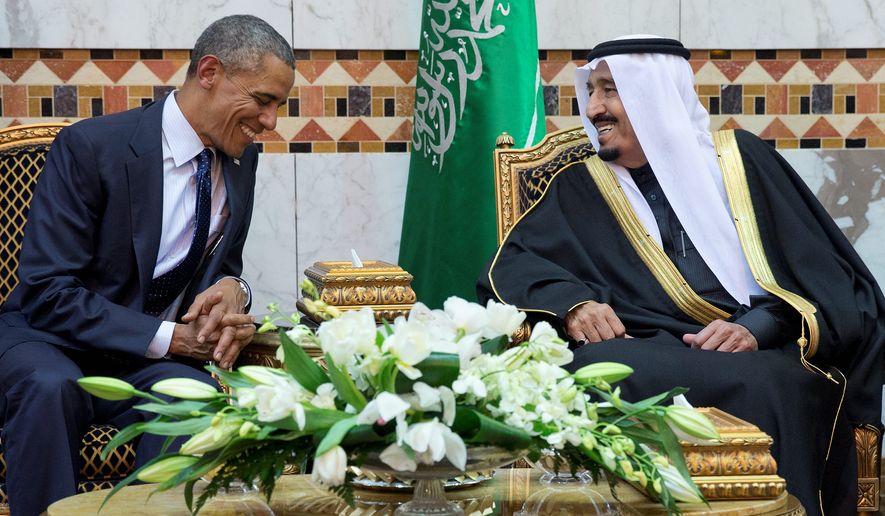President Obama’s method of handling nations with poor human rights records shifted dramatically in a matter of hours Tuesday, morphing from declarations about the need for sex equality while in India to public silence when he arrived in Saudi Arabia later in the day.
Before leaving India and traveling to Riyadh to pay respects to King Abdullah — the Saudi leader who passed away last week — the president spoke at length about human rights. He urged the that nation to pursue full equality for women and greater religious tolerance.
“If nations really want to succeed in today’s global economy, then they can’t simply ignore the talents of half of their people,” Mr. Obama said.
But just a few hours later, he said nothing publicly about Saudi Arabia’s record on human rights. Saudi women, among other things, are not allowed to drive cars and only recently gained the right to vote.
Saudi Arabia’s treatment of women was thrust directly into the spotlight Tuesday when Saudi state TV blurred first lady Michelle Obama’s face, presumably because her head was uncovered. The new Saudi king, Salman bin Abdul Aziz, also reportedly did not even acknowledge Mrs. Obama when he greeted the U.S. president.
Mr. Obama defended what could be seen as a double standard Tuesday, saying his administration will balance calls for equality and human rights with the need to cooperate on military and other matters.
SEE ALSO: Obama: Green growth will help India’s middle class
Saudi Arabia, for example, has partnered with the U.S. in air strikes against the Islamic State and has agreed to host the training of Syrian rebels who will battle the terrorist organization.
While the U.S. and Saudi Arabia have a complicated relationship, Mr. Obama says he still will call for changes in Riyadh.
“What I’ve found effective is to apply steady, consistent pressure, even as we are getting business done that needs to get done. And oftentimes that makes some of our allies uncomfortable, it makes them frustrated,” Mr. Obama told CNN’s Fareed Zakaria. “Sometimes we have to balance our need to speak to them about human rights issues with immediate concerns we have in terms of countering terrorism and regional stability. But the trend line is one I will sustain throughout the rest of my presidency. And that is to make an argument to those friends and allies of ours that if they want a society that is going to be able to sustain itself in this age, they’re going to have to change how they do business.”
Mr. Obama surely isn’t the first American president to publicly sidestep Saudi Arabia’s trampling of human rights and embrace a close relationship with the kingdom. Former President George W. Bush was very friendly with Abdullah, famously holding hands with the late leader during a 2005 meeting at Mr. Bush’s Texas ranch.
Specialists say that, whether it’s Mr. Obama, Mr. Bush or any other U.S. leader, talking about human rights should differ from country to country, as some are open and receptive to public criticism while others would fully reject it.
“You’ve got 200 countries in the world. If we actually treated them all the same and asked them all to make the same reforms at the same time, we’d probably end up with 190 enemies,” said Anthony Cordesman, the Arleigh A. Burke chair in strategy at the Center for Strategic and International Studies in Washington. “If you’re going to talk about this reform in Saudi Arabia, you do it quietly.”
SEE ALSO: Facebook to mute Muhammad criticism in Turkey after court order
The White House’s broader foreign policy increasingly has included repairing and strengthening relationships with known human rights violators.
The administration, for example, has begun to normalize diplomatic relations with Cuba, despite the human rights record of the communist-ruled island.
The U.S. insisted that Cuba release more than 50 political dissidents before restarting diplomatic ties, a demand that Havana agreed to, possibly paving the way for more reforms.
But in Saudi Arabia, despite some important changes such as allowing more women access to higher education, there are fears the human rights situation is getting worse, not better. Perhaps the best example is that of Saudi blogger Raif Badawi, who recently was sentenced to 10 years in prison and 1,000 lashes just for insulting Saudi clerics.
“It’s not like freedom of expression was ever tolerated before, but they’ve cracked down on it in a harsher way,” said Adam Coogle, a Middle East researcher with Human Rights Watch based in Jordan.
• Ben Wolfgang can be reached at bwolfgang@washingtontimes.com.




Please read our comment policy before commenting.